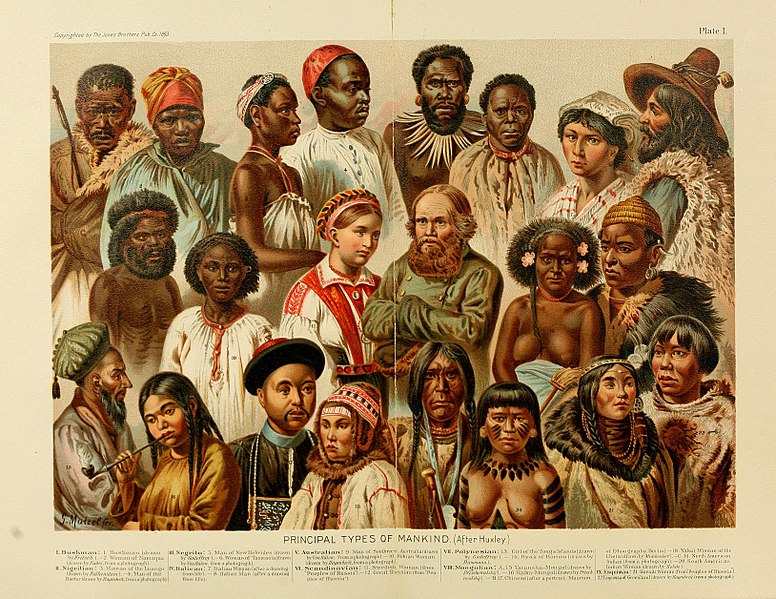Historical Perspectives On Contemporary Issues
Series: Perspectives on Racial Science (10 episodes)

Gustav Mützel's "Principal Types of Mankind (After Huxley)," 1893
This series of discussions by scholars in the humanities and social sciences explores a variety of issues related to science, race, and racism.
Listen to perspectives on the history of racial science around the world; the intersection of race with issues of class, gender, and scientific investigation; and the ways in which the pseudoscience on race continues on in the current era.
After listening, be sure to explore the "Resources" section with further reading and information for researchers.
- Richard Wetzell provides an analysis of "racial science" in Germany during the early years of the Nazi regime, showing us how medical doctors, physical anthropologists, and human geneticists wielded competing theories of race in order to influence public policy and maintain their professional status.
- Andy Evans discusses the history of racial science in Germany before the Nazi era, describing how Germany's nineteenth-century liberal anthropological tradition transmogrified into a hierarchical and racist "science" in the early part of the twentieth century.
- Stephen Kenny scrutinizes the career of surgeon Rudolph Matas and puts his life and work in the context of slavery, segregation, and racialized medicine in the U.S. South in the 19th and 20th centuries.
- Warwick Anderson discusses his investigations into the development of racial science in the Global South and the fabrication of whiteness as a "strategy of authority."
- Christa Kuljian shares her research on the field of paleoanthropology in South Africa and how ideas about racial hierarchies influenced its founding and development.
- Elise Burton analyzes the development of genetics, racial science, and race concepts in the contemporary Middle East.
- Sadiah Qureshi recounts the history of the exhibition of displayed peoples in nineteenth-century Britain, and how these shows contributed to the formation of anthropology.
- Sebastián Gil-Riaño examines how scientific articulations of human diversity have been used to both legitimize and confront notions of race and racism in the modern world.
- Rana Hogarth talks about how white physicians "medicalized" blackness in the late eighteenth and early nineteenth centuries, and how African-Americans pushed back against this endeavor.
- John Jackson discusses the legacy of nineteenth-century racial science on twentieth-century scientific investigation, the challenge to racial science made by population genetics and anthropology, and the ways in which the pseudoscience of race continues to inform twenty-first century debates.

Richard Wetzell
German Historical Institute, Washington, D.C.
Richard Wetzell is a Research Fellow at the German Historical Institute (GHI) in Washington, D.C. and editor of the GHI's Bulletin. Dr. Wetzell is a historian of modern Germany, with particular interests in the history of criminology and penal reform, and the history of the human and biological sciences.
Richard Wetzell provides an analysis of "racial science" in Germany during the early years of the Nazi regime, showing how medical doctors, physical anthropologists, and human geneticists wielded competing theories of race in order to influence public policy and maintain their professional status. Recorded February 4th, 2022.
Closed-captioning available on YouTube.

Andy Evans
SUNY New Paltz
Andy Evans is Associate Professor in the Department of History at SUNY New Paltz. Dr. Evans is a historian of twentieth-century Germany with a particular interest in cultural history and the history of anthropology. His first book, Anthropology at War: World War I and the Science of Race in Germany, examined how the First World War altered the physical and ideological spaces in which German anthropologists conducted their work, thereby facilitating a turn toward the virulently racist and nationalist racial science of the 1920s.
Andy Evans discusses the history of racial science in Germany before the Nazi takeover in 1933, describing how Germany's nineteenth-century liberal anthropological tradition transmogrified into a hierarchical and racist "science" in the early part of the twentieth century. Recorded December 16, 2021.
Closed-captioning available on YouTube.

Stephen Kenny
University of Liverpool
Stephen Kenny is a Senior Lecturer in the Department of History at the University of Liverpool. His research and teaching explore histories of race, slavery, and medicine in the context of the 19th- and 20th-century United States, examining the deep-rooted nature of racism in medical education, research, and practice under slavery and Jim Crow segregation. His work can be found in numerous scholarly journals including the American Journal of Public Health, the Bulletin of the History of Medicine, the Journal of the History of Medicine and Allied Sciences, and Social History of Medicine.
Stephen Kenny scrutinizes the career of surgeon Rudolph Matas, the so-called "father of vascular surgery." Kenny demonstrates how his life and work must be understood in the context of segregation in the U.S. South and the racialized medicine that was practiced there in the 19th and 20th centuries. He also highlights the ways in which Matas used medical photography to legitimate an ideologically driven racialized research agenda. Recorded March 30, 2021.
Closed-captioning available on YouTube.

Warwick Anderson
University of Sydney
Warwick Anderson is the Janet Dora Hine Professor of Politics, Governance and Ethics in the Department of History at the University of Sydney, and leader of the Politics, Governance and Ethics Theme with the Charles Perkins Centre. As an historian of science, medicine and public health, Dr. Anderson's work has focused on ideas about race, human difference, and citizenship in the 19th and 20th centuries, particularly in Australasia, the Pacific, Southeast Asia, and the United States.
In this episode of our podcast series on racial science, Anderson discusses the differences between how racial science was practiced in the Global South and how it was practiced in North America and Europe. He notes that theories about race—and thus the practices of racial science—were often more malleable and flexible in the Southern Hemisphere, as opposed to the more rigid racial typologies and hardline eugenics that characterized the United States and Western Europe. In addition, following the work of James Baldwin and Homi Bhabha, Anderson notes how whiteness has been used as a "strategy of authority" for colonial settlers rather than as a robust identity, a fact he illustrates through his research on race in Australia and the Philippines.
Warwick Anderson discusses his investigations into the development of racial science in the Global South and the fabrication of whiteness as a "strategy of authority." Recorded March 18, 2021.
Closed-captioning available on YouTube.

Christa Kuljian
University of the Witwatersrand
Christa Kuljian is a writer, author, and Research Associate at WiSER, the Wits Institute for Social and Economic Research in Johannesburg, South Africa. In Darwin's Hunch: Science, Race, and the Search for Human Origins, Kuljian examines the history of paleoanthropology in South Africa, interrogating the ways in which ideas about racial hierarchies influenced the founding and development of the field. Her research demonstrates how the social and political context in which paleoanthropology has been practiced in South Africa and elsewhere influenced the development of the science, and how present-day scientists are pushing back against their field's troubling legacy.
Christa Kuljian shares her research on the origins, development, and legacy of paleoanthropology in South Africa. Recorded March 16, 2021.
Closed-captioning available on YouTube.

Elise Burton
University of Toronto
Elise Burton is Assistant Professor at the Institute for the History and Philosophy of Science and Technology at the University of Toronto. Her research focuses on the relationship between the life sciences and the formation of racial, ethnic, and national identities in the Middle East. Professor Burton's first book, Genetic Crossroads: The Middle East and the Science of Human Heredity, shows how Middle Eastern peoples—both as scientific actors and research subjects—played an important role in the history of human genetics. Her work can be found in numerous scholarly journals including Isis, Social Studies of Science, and Comparative Studies of Science and History.
Elise Burton discusses the development of genetics, racial science, and concepts of race in the Middle East. Recorded February 5, 2021.
Closed-captioning available on YouTube.

Sadiah Qureshi
University of Birmingham
Sadiah Qureshi is Senior Lecturer in Modern History at the University of Birmingham. Her research explores the ways in which racialized knowledge is produced, circulated, and mobilized in the modern world. Her first book, Peoples on Parade, provided the first substantial survey of the commercial exhibition of displayed peoples in nineteenth-century Britain. It explores the importance of such shows for intercultural encounter and notions of racial difference, and how such shows contributed to the formation of anthropology as a discipline.
Sadiah Qureshi recounts the history of the exhibition of displayed peoples in nineteenth-century Britain, and how these shows contributed to the formation of anthropology. Recorded July 6, 2020.
Closed-captioning available on YouTube.

Sebastián Gil-Riaño
University of Pennsylvania
Sebastián Gil-Riaño is Assistant Professor in the Department of History and Sociology of Science at the University of Pennsylvania. He is a historian of transnational science focusing on scientific conceptions of race, culture, and indigeneity in the twentieth century. By approaching these topics from the perspective of Latin America and the global South, his research investigates how scientific articulations of human diversity have been used to both legitimize and confront political formations in the modern world. Professor Gil-Riaño's work challenges the conventional geographies and periodization that have long shaped historical understandings of race and racism. His work can be found in numerous scholarly journals including Social History of Medicine, The British Journal for the History of Science, and Isis.
Sebastián Gil-Riaño examines how scientific articulations of human diversity have been used to both legitimize and confront notions of race and racism in the modern world. Recorded June 30, 2020.
Closed-captioning available on YouTube.

Rana Hogarth
University of Illinois
Rana Hogarth is Assistant Professor in the Department of History at the University of Illinois. Her research focuses on the medical and scientific constructions of race during the era of slavery and beyond. Professor Hogarth's first book, Medicalizing Blackness: Making Racial Difference in the Atlantic World, 1780-1840, examined how white physicians "medicalized" blackness—a term she uses to describe the process by which white physicians defined blackness as a medically significant marker of difference in slave societies of the American Atlantic. Her work can be found in numerous scholarly journals including the American Journal of Public Health, American Quarterly, and African and Black Diaspora.
Rana Hogarth talks about how white physicians "medicalized" blackness in the late eighteenth and early nineteenth centuries, and how African-Americans pushed back against this endeavor. Recorded June 23, 2020.
Closed-captioning available on YouTube.

John Jackson
Michigan State University
John Jackson is Professor in the James Madison College at Michigan State University. His research and teaching focuses on the history of race and racism, particularly on the ways in which racism has been portrayed as "rational" through scientific and legal language. He has written and edited numerous books, including Social Scientists for Social Justice: Making the Case Against Segregation and Darwinism, Democracy, and Race: American Anthropology and Evolutionary Biology in the Twentieth Century. His work has appeared in leading academic journals including American Psychologist, Isis, Philosophy of Science, and Rhetoric Society Quarterly.
John Jackson discusses the legacy of nineteenth century racial science on twentieth century scientific investigation, the challenge to racial science made by population genetics and anthropology, and the ways in which the pseudoscience of race continues to inform twenty-first century debates. Recorded July 3, 2020.
Insights from the Collections
The Consortium's collections provide many opportunities to learn more about the history of science, race, and racism.
Our cross-institutional search tool allows researchers to investigate materials across multiple institutions from a single interface. With millions of catalog records of rare books and manuscripts and thousands of finding aids, the Consortium's search hub offers scholars and the public the ability to identify and locate relevant materials.
Search the Consortium search hub.
Some archival materials related to this topic include:
Rudolf Virchow Medical Society Records, New York Academy of Medicine
L.C. Dunn Papers, American Philosophical Society
Ashley Montagu Papers, American Philosophical Society
Samuel George Morton Papers, American Philosophical Society
Raymond Pearl Papers, American Philosophical Society
Theodosius Dobzhansky Papers, American Philosophical Society
Franz Boas Papers, American Philosophical Society
Ernst Mayr Papers, American Philosophical Society
Victor George Heiser Papers, American Philosophical Society
Samuel George Morton Papers, Library Company of Philadelphia
Carleton Stevens Coon Papers, Smithsonian Institution
Ernest Hooton Papers, Harvard University
Other Web resources:
The Disturbing Resilience of Scientific Racism, by Ramin Skibba; Smithsonian Magazine
Racism in Science: The Taint that Lingers, by Robin Nelson; Nature
How to Fight Racism Using Science, by Adam Rutherford; The Guardian
Learn more about our speakers:
Richard Wetzell
Andy Evans
Warwick Anderson
Christa Kuljian
Elise Burton
Sadiah Qureshi
Sebastián Gil-Riaño
Rana Hogarth
John Jackson
Related publications from our speakers:
Eugenics, Racial Science, and Nazi Biopolitics: Was There a Genesis of the 'Final Solution' from the Spirit of Science?, by Richard F. Wetzell, in Beyond the Racial State: Rethinking Nazi Germany, edited by Devin O. Pendas, Mark Roseman, and Richard F. Wetzell; Cambridge University Press, 2017.
Anthropology at War: World War I and the Science of Race in Germany, by Andrew D. Evans; University of Chicago Press, 2010.
From Racial Types to Aboriginal Clines: The Illustrative Career of Joseph B. Birdsell, by Warwick Anderson; Historical Studies in the Natural Sciences 50(5), 2020.
Colonial Pathologies: American Tropical Medicine, Race, and Hygiene in the Philippines, by Warwick Anderson; Duke University Press, 2006.
The Cultivation of Whiteness: Science, Health, and Racial Destiny in Australia, by Warwick Anderson; Melbourne University Press, 2002.
Darwin's Hunch: Science, Race, and the Search for Human Origins, by Christa Kuljian; Jacana Media, 2016.
Genetic Crossroads: The Middle East and the Science of Human Heredity, by Elise K. Burton; Stanford University Press, 2021.
Peoples on Parade: Exhibitions, Empire, and Anthropology in Nineteenth-Century Britain, by Sadiah Qureshi; University of Chicago Press, 2011.
Relocating Anti-Racist Science: The 1950 UNESCO Statement on Race and Economic Development in the Global South, by Sebastián Gil-Riaño; British Journal for the History of Science 51(2), 2018.
Medicalizing Blackness: Making Racial Difference in the Atlantic World, 1780-1840, by Rana A. Hogarth; UNC Press, 2017.
Darwinism, Democracy, and Race: American Anthropology and Evolutionary Biology in the Twentieth Century, by John P. Jackson, Jr., and David J. Depew; Routledge, 2017.
Science for Segregation: Race, Law, and the Case Against Brown v. Board of Education, by John P. Jackson, Jr.; NYU Press, 2005.
Social Scientists for Social Justice: Making the Case Against Segregation, by John P. Jackson, Jr.; NYU Press, 2001.
See also recent work from our fellows:
Nazi Entanglement: Pascual Jordan, Quantum Mechanics, and the Legacy of the Third Reich, Ryan Dahn
Human Remainders: The Lost Century of the Samuel George Morton Collection, Paul Mitchell
Between Cope and Osborn: The Role of American Biological Discourse on the Public Debate on Evolution, David Ceccarelli
Colored Insane: Slavery, Asylums, and Mental Illness in the 19th Century, Diana Louis
Abolition and the Making of Scientific Racism in the Anglo-Atlantic, Sean M. Smith
By Their Locks You Shall Know Them: Race, Science, and Hair in the Nineteenth Century, Timothy Minella
The Peculiar Institution and the Making of Modern Psychiatry, 1840-1880, by Wendy Gonaver; UNC, 2019.
Monstrous Childbirth: Concepts of Race and Defective Reproduction in Nineteenth-Century U.S. Science, Medicine, and Law, Miriam Rich
Treating the Black Body: Race and Medicine in American Culture, 1800-1861, Christopher Willoughby
Related forums and podcasts:
Black Maternal Health: Historical and Reproductive Justice Reckonings
Immortal Life: The Promises and Perils of Biobanking and the Genetic Archive
Materials of the Mind, an interview with James Poskett
The Lost White Tribe, an interview with Michael Robinson
Bone Rooms, an interview with Sam Redman